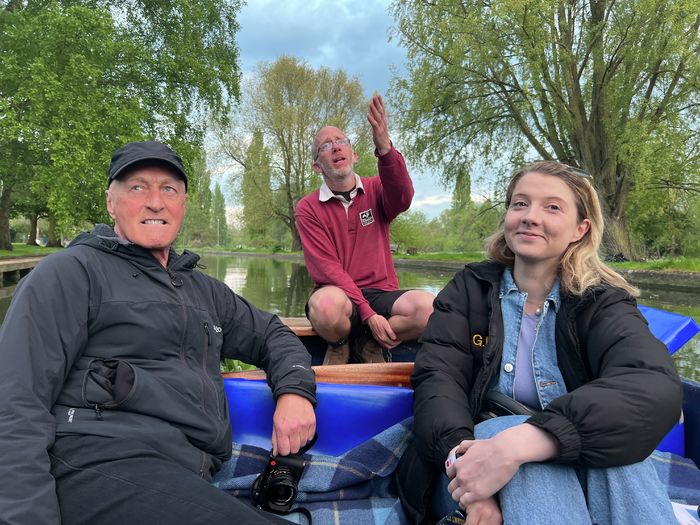Meet ‘Birdgirl’: The second-year undergrad with an honorary doctorate
Sophie Denny gets talking with activist Mya-Rose Craig about environmentalism, green inequality, and race

Mya-Rose Craig is a second year HSPS student at John’s. She also, however, already has a memoir and an honorary Doctorate to her name.
Also known as 'Birdgirl' – a nickname taken from “a corny superhero from the sixties” she came across – Mya is a prominent environmentalist and race activist, starting her Birdgirl Blog in 2014. Nature has been significant throughout her life, with her parents and sister being avid birdwatchers, and this gave her an acute awareness of environmental issues from a young age: “if you love nature and the outdoors, you also have to care about environmental issues, otherwise it feels a bit hypocritical.”
“No one in the West seemed to care”
Following an oil spill in the Sundarbans Mangroves in Bangladesh, a UNESCO World Heritage Site, Mya’s campaigning took off. She recalls being “incredibly frustrated because no one in the West seemed to care about it”, and so she took matters into her own hands, raising $35,000 for the clean-up in just three days.
Mya has been relentless in campaigning ever since, both for environmental concerns and for equal access to nature, in particular for Visible Minority Ethnic (VME) children and teenagers. Black2Nature, her VME-led organisation, serves a few main purposes: “engaging kids with nature and the outdoors”, talking about climate change and mental health, and providing them with “three square meals a day”, all while working with other NGOs to campaign for change.
Nature is known to have numerous benefits for both mental and physical health. For Mya, birdwatching is her “version of mindfulness”, allowing her to slow down and take a break, and she strongly encourages others to get out into nature. Despite lots of the green spaces in Cambridge being “very pruned”, she still manages to take time out of her busy schedule to retreat into nature, including watching the birds at Castle Mound. Her favourite birds in the UK are wrens: “they’re really cute”.
“I want to see equitable access to the countryside and outdoors”
Discussing the benefits of nature, Mya references Green Social Prescribing (GSP), launched by the government and NHS in 2020. This supports people to engage in nature-based activities to improve their mental health. A government survey conducted in Spring 2022 found that 66% of the 4000 respondents felt they would experience an increased feeling of calm following GSP, while 41% felt it would decrease symptoms of their mental health condition. Mya is convinced that if people “just went on a twenty minute walk in the park or sat on some grass, they would genuinely feel so much better”. It seems simple, so why aren’t more people doing it?
Recent reports reveal huge disparities in access to nature: black people in England are four times more likely than white people to have no outdoor space at home, while 73% of children from lower-income households spent less time outdoors after the pandemic started, compared to 57% from higher-income households. When asked why she thinks such inequalities exist, Mya responds “there’s a big issue in the UK in general in terms of post-industrial revolution, the countryside being reserved for the white, upper-middle class”, causing nature to become a homogenised sector. Trying to resolve this deep-rooted issue is difficult as, according to Mya, “there’s so many little factors”, hence her relentless activism.
Mya’s understanding of nature’s numerous benefits partly inspired her memoir published last year, "Birdgirl”. She laughs when I ask her about the process of writing an autobiography, saying, “I find it so weird to use that word…I didn’t sit down when I was eighteen and think, ‘Okay, I need to write a memoir now!’”. While she jokes she has “no intention of writing ‘Birdgirl: Part Two’ in 20 years”, she describes the writing process as “surprisingly easy” – she knew what she wanted to write and used her time stuck at home during the pandemic to put pen to paper. Throughout our conversation, Mya has been passionate about her work, yet modest about her achievements, stating she never could have expected all these successes. It is a relief when she confirms she feels “very proud about that book”.
Although another memoir is not on the table, Mya will not stop campaigning anytime soon. When I ask about her personal future plans, she laughs, deciding “that’s a problem for after graduation”. On her hopes for the future landscape of conservation and environmentalism, she is far more conclusive: “I want to see equitable access to the countryside and outdoors, [and] intersectional, equitable movement that prioritises global climate justice and indigenous rights.”
 News / Cambridge academics sign open letter criticising research funding changes22 February 2026
News / Cambridge academics sign open letter criticising research funding changes22 February 2026 Features / Beyond the porters’ lodge: is life better outside college?24 February 2026
Features / Beyond the porters’ lodge: is life better outside college?24 February 2026 Theatre / Footlights Spring Revue? Don’t Mind if I Do!25 February 2026
Theatre / Footlights Spring Revue? Don’t Mind if I Do!25 February 2026 News / Cambridge and Manchester Universities meet for innovation partnership26 February 2026
News / Cambridge and Manchester Universities meet for innovation partnership26 February 2026 Fashion / The evolution of the academic gown24 February 2026
Fashion / The evolution of the academic gown24 February 2026










![How to Create an Attractive Freelancer Portfolio [5 Tips & Examples]](https://www.varsity.co.uk/images/dyn/ecms/320/180/2026/02/vitaly-gariev-ho2tNOWZYXM-unsplash-scaled.jpg)